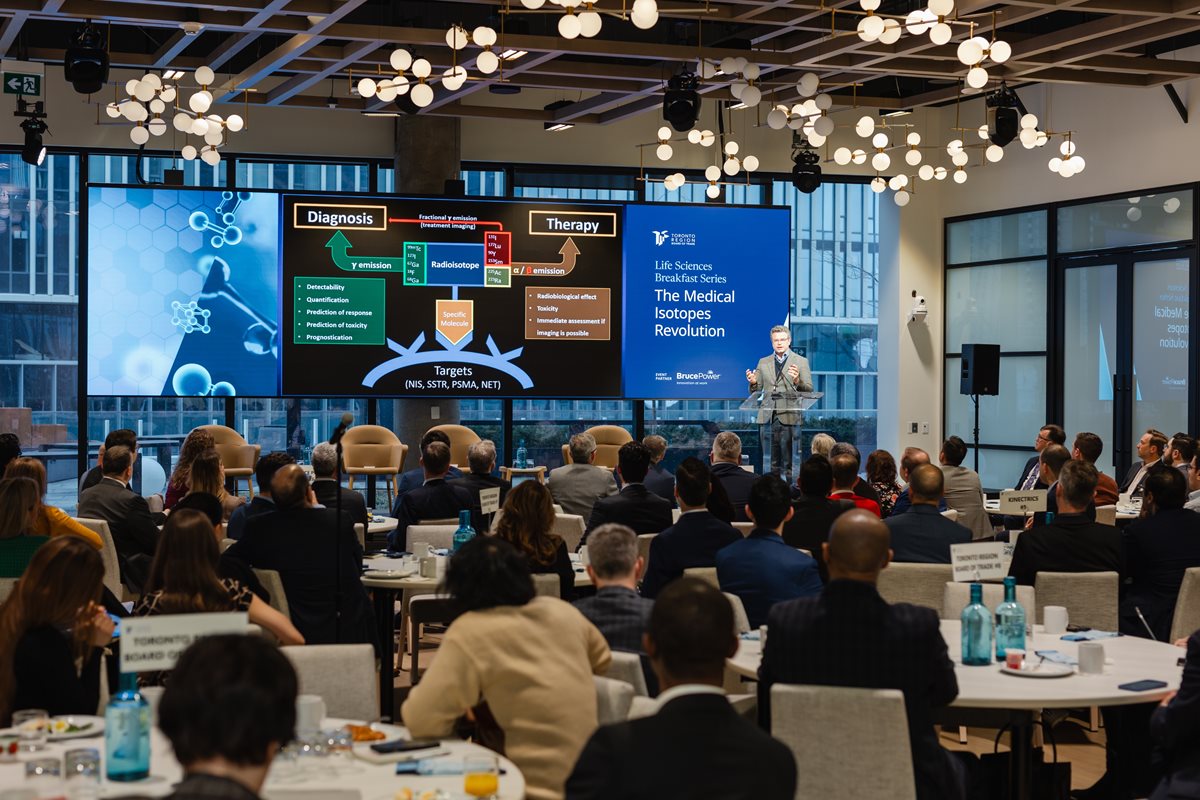This is the first event in our new Life Sciences breakfast series which comes on the heels of our Life Sciences Symposium, where we asked the question, can Toronto be the next Boston?

"Canada's unique position, equipped with cutting-edge CANDU nuclear reactors, places upon us not merely a national responsibility but a global imperative to provide medical isotopes," emphasized James Scongack at our recent life sciences event. A mug etched with "Failure is not an option" sits prominently on his desk, a constant reminder of the pivotal role he, as EVP & Chief Development Officer of Bruce Power, and Canada at large play in the global health arena. With cancer directly affect one in five people globally, the impact of this disease is universally felt, reinforcing Canada's moral obligation to leverage its resources for global benefit. "Given our wealth of nuclear reactors, particularly the CANDU reactors known for their unmatched flexibility, Canada is uniquely equipped to produce and supply these lifesaving treatments to the world. If Canada can't provide the world with the isotopes that are needed, we won't have them," Scongack stated.

By harnessing the cutting-edge technology of CANDU nuclear reactors, our region stands at the forefront of a healthcare revolution. The unique heavy water design of this country’s reactors allows Canada to produce the isotopes most needed to treat cancer. Dr. Patrick Veit-Haibach, Professor of Nuclear Medicine and Radiology at the University Health Network, noted isotopes’ ability to markedly improve patient quality of life with minimal side effects. "Your quality of life is better with this treatment," asserted Dr. Veit-Haibach, pointing to the substantial clinical benefits and remarkable efficacy of medical isotopes in fighting cancer.

Dr. Bradly Wouters is a senior scientist and EVP at Canada's largest research hospital, The University Health Network (UHN), which invested $600M in research last year alone. Dr. Wouters believes that there are not only enormous health benefits to developing medical isotopes, but there are also immense economic opportunities: "There’s an opportunity for commercial success, but it demands significant investment and the right partners to transform novel research into clinical trials." Dr. Wouters says there are dozens of companies involved in this space, but he stresses there’s an urgent need for investment from government, philanthropists and private donors. “Our collective future in medical isotopes hinges on continued investment and forming strategic partnerships. The Toronto Region Board of Trade's involvement underscores the significance of our mission, positioning us to capitalize on the ripe potential before us," he said.
While there’s no doubt further investments are needed, the research and development of medical isotopes is already garnering a great deal of attention from investors in our region. Dr. Bob Bell served as Ontario’s Deputy Minister of Health from 2014 to 2018, he’s now Professor Emeritus at the University of Toronto’s Temerity Faculty of Medicine. Dr. Bell highlighted the significant investments already being made in this space by major investors, including the province's largest pension fund OMERS, noting: "The sector marries groundbreaking healthcare innovation with robust economic opportunity. This blend of advancing health and promising economic returns has made medical isotopes a key focus for investors seeking impactful investments."
Ontario is rapidly scaling innovative healthcare startups by combining the Toronto region’s strengths in research and nuclear power. In our quest to grow our economy and improve our healthcare outcomes, medical isotopes are a vital opportunity for our life sciences ecosystem and represent the very best of what Toronto can offer as a world class life sciences hub.
This discussion was the first in a new series of Life Sciences focused events the Board will be hosting over the coming months. Our next event will focus on Catalyzing Cluster Ecosystems, where we will convene industry experts, academics and business leaders to explore our region's strengths and weaknesses and to analyze the key elements that drive successful Life Sciences ecosystems.
Thank you to our Event Partner, Bruce Power.


